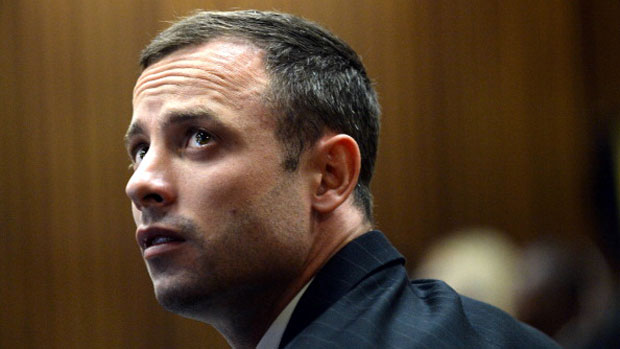Oscar Pistorius: South African interpreters slip up again
Dubious translations in Pretoria court compared with Nelson Mandela memorial service fiasco

A free daily email with the biggest news stories of the day – and the best features from TheWeek.com
You are now subscribed
Your newsletter sign-up was successful
SOUTH AFRICAN interpreters at the Oscar Pistorius trial have been criticised again, just months after the sign language fiasco at Nelson Mandela's memorial service.
It began with a 90-minute delay to the start of the trial yesterday, after the court interpreter employed to translate witness testimonies from Afrikaans to English never appeared.
Some claim she turned up to the wrong court. Others say she took one look at the mass of photographers and journalists outside the courtroom and quit the case in an "emotional" state.
The Week
Escape your echo chamber. Get the facts behind the news, plus analysis from multiple perspectives.

Sign up for The Week's Free Newsletters
From our morning news briefing to a weekly Good News Newsletter, get the best of The Week delivered directly to your inbox.
From our morning news briefing to a weekly Good News Newsletter, get the best of The Week delivered directly to your inbox.
Her replacement was subsequently criticised for "ropey" translations, with the witness, Michelle Burger, repeatedly correcting her English. As the defence questioned why Burger had described the evening of the shooting as "confusing", she explained that the translator was interpreting what she was saying but the "words are not exactly the same".
The interpreter later excused herself from the room after a coughing fit and Burger gave up speaking in her mother tongue to give the rest of her testimony in English.
After the Mandela interpreter fiasco, #Pistorius trial is delayed by missing interpreter, then first witness says interpeter is off target.— David Smith (@SmithInAfrica) March 3, 2014
"Did another South African event get lost in translation?" asks the Wall Street Journal, comparing the trial to the memorial service for Mandela in Johannesburg last year, when the South African government hired a self-confessed schizophrenic sign language interpreter. He stood feet away from global leaders, signing about "rocking horses" and "prawns" while he was supposed to be translating eulogies.
Meanwhile, the mother of yesterday's court interpreter claims she had raised concerns about being inexperienced but the justice department did not give her a choice. Speaking to a local radio station, Jacaranda FM, the mother insisted: "My daughter can speak English, but the pressure was too much."
A free daily email with the biggest news stories of the day – and the best features from TheWeek.com
The justice department will not comment on proceedings and says it is for the presiding officer Judge Thokozile Masipa to deal with any concerns.
Today, a new interpreter appeared at court, but lawyers have already stepped in to question her accuracy after she translated "noises" as "gunshots" and British correspondents are complaining that she is "harder to understand than the last one".
-
 Tourangelle-style pork with prunes recipe
Tourangelle-style pork with prunes recipeThe Week Recommends This traditional, rustic dish is a French classic
-
 The Epstein files: glimpses of a deeply disturbing world
The Epstein files: glimpses of a deeply disturbing worldIn the Spotlight Trove of released documents paint a picture of depravity and privilege in which men hold the cards, and women are powerless or peripheral
-
 Jeff Bezos: cutting the legs off The Washington Post
Jeff Bezos: cutting the legs off The Washington PostIn the Spotlight A stalwart of American journalism is a shadow of itself after swingeing cuts by its billionaire owner
-
 Epstein files topple law CEO, roil UK government
Epstein files topple law CEO, roil UK governmentSpeed Read Peter Mandelson, Britain’s former ambassador to the US, is caught up in the scandal
-
 Iran and US prepare to meet after skirmishes
Iran and US prepare to meet after skirmishesSpeed Read The incident comes amid heightened tensions in the Middle East
-
 Israel retrieves final hostage’s body from Gaza
Israel retrieves final hostage’s body from GazaSpeed Read The 24-year-old police officer was killed during the initial Hamas attack
-
 China’s Xi targets top general in growing purge
China’s Xi targets top general in growing purgeSpeed Read Zhang Youxia is being investigated over ‘grave violations’ of the law
-
 Panama and Canada are negotiating over a crucial copper mine
Panama and Canada are negotiating over a crucial copper mineIn the Spotlight Panama is set to make a final decision on the mine this summer
-
 Why Greenland’s natural resources are nearly impossible to mine
Why Greenland’s natural resources are nearly impossible to mineThe Explainer The country’s natural landscape makes the task extremely difficult
-
 Iran cuts internet as protests escalate
Iran cuts internet as protests escalateSpeed Reada Government buildings across the country have been set on fire
-
 US nabs ‘shadow’ tanker claimed by Russia
US nabs ‘shadow’ tanker claimed by RussiaSpeed Read The ship was one of two vessels seized by the US military